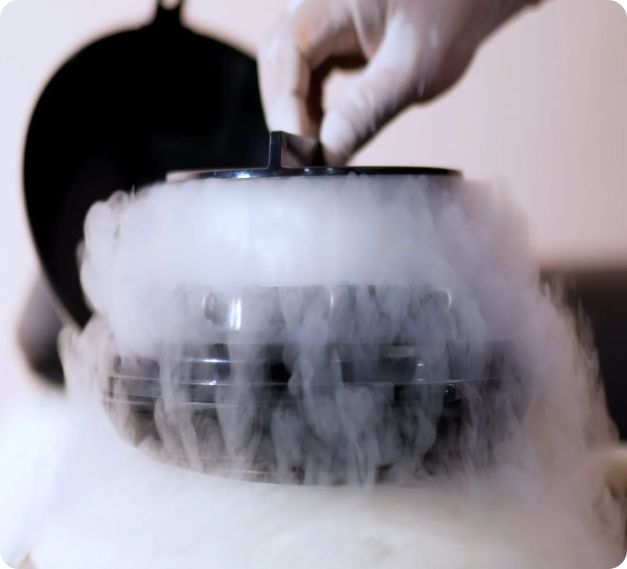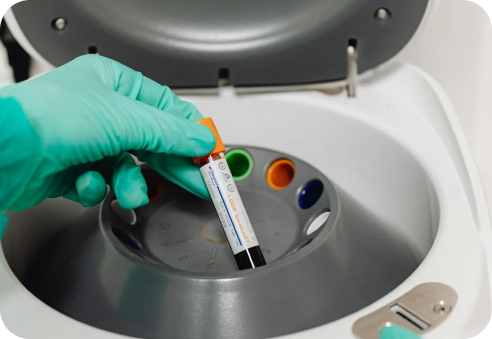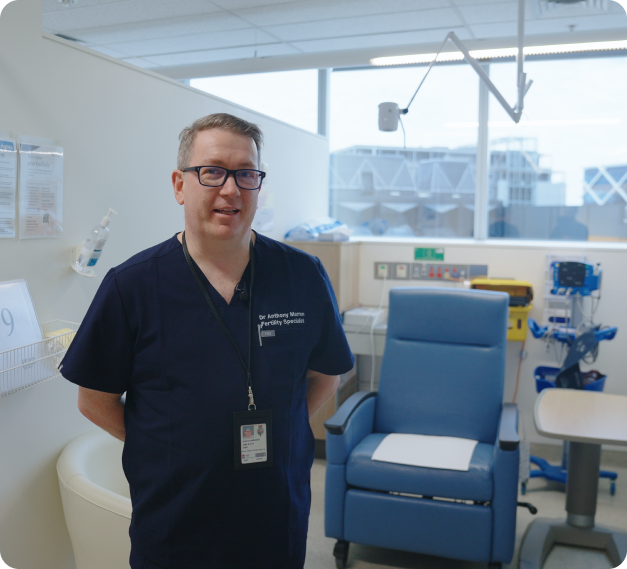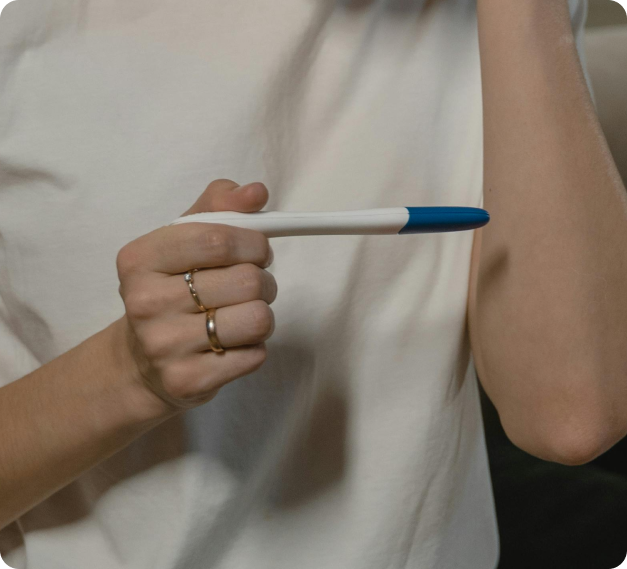

Egg freezing, or egg cryopreservation, involves retrieving a woman’s eggs, freezing them, and storing them for future use. There are two reasons why someone would want to freeze their eggs:

The rationale behind egg freezing is that 'younger' eggs are of better quality due to lower rates of chromosome error. Pregnancy and live birth rates are based on the age of the egg(s). You can see below the impact that age has on the live birth rates from fresh eggs where insemination is via ICSI is:
For further information:
https://www.genea.com.au/pages/egg-freezing-MC3MTZW2J5GRAONFMNFGQ7NWM7HA;
https://www.fertilitysociety.com.au/fertility-preservation-australia-new-zealand/.

Many personal circumstances make someone a candidate for freezing eggs in Sydney. Some of these factors include:

To begin the egg-freezing process, you'll have an in-person consultation where we review blood tests that measure your ovarian reserve, and an ultrasound where we count the number of follicles. Both of these tests are good from a quantitative perspective. However, they are not good from a qualitative perspective and the most important factor here is female age.

Egg freezing requires a stimulated cycle of IVF. This is where self-administered, daily injections of Follicle Stimulating Hormone (FSH) are used for 10 – 12 days to recruit a cohort of follicles from the ovaries.
We’ll then check your progress with regular blood tests and ultrasounds at our Sydney clinic to ensure that the follicles are increasing in size and hormone levels going up appropriately.
When a reasonable number of follicles are of sufficient size and are likely to contain mature eggs, a ‘trigger’ injection is given.

The Oocyte (egg) Pick-Up (OPU) occurs 36-hours after the trigger injection. The OPU will be performed under a general anaesthetic.
Generally, this procedure is quick and easy, taking about 20 minutes. Although we do recommend taking a full day to recover and rest afterwards.

Your eggs are then vitrified using the latest in freezing technology and safely stored with us until you’re ready to use them.
Within the Genea network, since 2010, approximately 10 - 15% of women have returned to use their frozen eggs - this is comparable to International data.
Medically-indicated fertility preservation is recommended for women whose medical condition or treatment, such as chemotherapy, may negatively impact their fertility. Options for fertility preservation include:

Zoladex (3.6mg SC every 4 weeks) may reduce ovarian exposure to chemotherapy by decreasing ovarian blood flow. While studies, primarily in women with breast cancer, are promising, Zoladex is generally used as a complementary option, either on its own or alongside other fertility preservation methods.
This option involves freezing ovarian tissue and is ideal when there is insufficient time to complete an IVF cycle. It is increasingly recognised as a viable fertility preservation method.
Medically-indicated fertility preservation provides hope and options for women to safeguard their future reproductive potential. Consulting a fertility specialist is the first step to exploring these possibilities.

After the egg-freezing process, you can expect a few things. First, you might have some mild discomfort or cramping - similar to what you might feel on your period. This is normal as your body adjusts after the hormone stimulation and egg retrieval.
You’ll have a follow-up appointment to chat about results and next steps. Your frozen eggs will be stored securely, and you’ll be informed about any ongoing storage fees. If you decide to use your frozen eggs in the future, the process for thawing and fertilising them will be explained in detail.
Emotionally, it’s normal to feel a mix of relief and uncertainty. Many people find it helpful to talk to friends, family, or a counsellor about their experience.

The good news is, there's no rush. Research shows that frozen eggs can stay viable for at least 10 years and there have been successful pregnancies from eggs stored even longer.
The exact time can depend on storage conditions and freezing techniques, so it's always best to discuss your specific situation with your fertility specialist.

The cost of egg freezing in Australia can depend on the clinic and the services included.
Typically, you can expect the total cost to cover consultations, hormone stimulation, monitoring, egg retrieval, and freezing. On average, the whole process ranges from $6,000 to $10,000.

Deciding to freeze eggs depends on personal circumstances, age, and reproductive goals. Women should consider their ovarian reserve, medical history, and future family plans.
Ideally, it’s best to consider freezing your eggs in your late 20s to early 30s when egg quality and quantity are generally higher. However, if you’re above this age and have concerns about your fertility, it’s important to seek help sooner rather than later.
If you have medical conditions that might affect your fertility - like cancer or hormonal disorders - egg freezing can be a proactive way to safeguard your chances of having children later on. For women facing treatments such as chemotherapy, freezing eggs can help preserve the possibility of future pregnancy.

While egg freezing can significantly increase your chances of conceiving later, it doesn’t guarantee a successful pregnancy. Factors like age at the time of freezing and the quality of the eggs play a big role in the outcome.
Many people believe that you can only freeze eggs when you’re in your 20s, but that’s not true! While younger eggs tend to be better quality, women of various ages can still benefit from egg freezing.
Many women worry about pain during the egg-freezing process, but most find it manageable. While you might feel some discomfort from hormone injections or the retrieval procedure, clinics often provide sedation options to help you feel more comfortable.
Some think that frozen eggs aren't as viable as fresh ones, but advances in freezing technology have made it possible to maintain the quality of frozen eggs. Many women have successfully used frozen eggs to get pregnant.
While egg freezing is an option for women facing medical treatments, it’s also a viable choice for anyone wanting to delay pregnancy for personal or professional reasons. It’s about empowering women to make choices that suit their lives.

Success rates for egg freezing can vary based on your age, the number of eggs you freeze, and your overall reproductive health. Generally, younger women (in their 20s and early 30s) have better chances of success.
In a typical egg-freezing cycle, about 90% of the eggs survive thawing, 70% are successfully fertilised, and around 45% can develop into a usable embryo. Freezing around 15 to 20 eggs can improve your odds, but everyone’s situation is different.

In a traditional IVF cycle where egg and sperm are being bought together fresh, we counsel that not every follicle will contain an egg; not every egg will be mature; not every mature egg will fertilise; and not every fertilised egg will make it to a useable embryo.
For example, if a woman does get 10 eggs, 8 will fertilise, 6 will make it to day three and in a good cycle, someone will have 2 to 3 usable embryos at the end.

If you’re considering egg freezing to preserve your fertility, it’s important to have personalised advice and support tailored to your unique circumstances. Whether for medical reasons or personal planning, we offer advanced options to help you take charge of your reproductive future.
Schedule a consultation today to explore your options and make informed decisions when it comes to freezing your eggs.
Egg freezing costs vary but typically range between $6,000 and $10,000 per cycle, with additional annual storage fees.
Risks include ovarian hyperstimulation syndrome (OHSS), mild bloating, and discomfort. Egg quality and quantity may also decline with age.
The entire process, including ovarian stimulation, egg retrieval, and freezing, takes about two to three weeks.
The ideal age for egg freezing is before 35 when egg quality and quantity are at their peak.
Eggs can be stored indefinitely, but success rates decline with age at retrieval.
Success depends on age at freezing. Women under 35 have higher success rates, with about 70–80% of eggs surviving the thawing process.
Higher-quality eggs have a greater chance of fertilization and implantation, leading to successful pregnancy outcomes.
Understanding the emotional journey couples endure when they have difficulty conceiving or recurrent pregnancy loss is essential to my approach.
Creative Advertising by Kiin Agency.